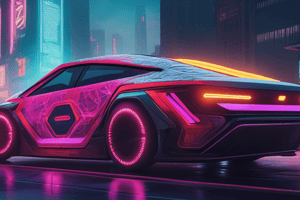Podcast
Questions and Answers
In the future, a car specifically designed for ______ driving may make sense.
In the future, a car specifically designed for ______ driving may make sense.
urban
Volkswagen has a small two-person concept car prototype that weighs 640 pounds and consumes one liter of gasoline per 100 kilometers (some 240 miles per gallon—existing average U.S.light-duty vehicles use 10 liters per 100 kilometers, or just under 25 miles per gallon).
Volkswagen has a small two-person concept car prototype that weighs 640 pounds and consumes one liter of gasoline per 100 kilometers (some 240 miles per gallon—existing average U.S.light-duty vehicles use 10 liters per 100 kilometers, or just under 25 miles per gallon).
urban
Some argue that downsizing reduces ______, but these issues can be minimized.
Some argue that downsizing reduces ______, but these issues can be minimized.
safety
Promoting Change Better technology will undoubtedly improve fuel ______.
Promoting Change Better technology will undoubtedly improve fuel ______.
A coordinated package of fiscal and regulatory policies will need to come into play for fuel-reduction benefits to be realized from these future ______.
A coordinated package of fiscal and regulatory policies will need to come into play for fuel-reduction benefits to be realized from these future ______.
The feebate combines well with stricter Corporate Average Fuel Economy (CAFE) standards—in other words, with regulations that require automobile makers to produce products that consume less ______.
The feebate combines well with stricter Corporate Average Fuel Economy (CAFE) standards—in other words, with regulations that require automobile makers to produce products that consume less ______.
Researchers are exploring more radical propulsion systems and fuels, especially those that have the potential for low life-cycle carbon dioxide emissions. Several organizations are developing hydrogen-powered fuel cell vehicles in hybrid form with a battery and an electric motor. Such systems could increase vehicle efficiency by a factor of two, but much of that benefit is offset by the energy consumed and the emissions produced in making and distributing ______.
Researchers are exploring more radical propulsion systems and fuels, especially those that have the potential for low life-cycle carbon dioxide emissions. Several organizations are developing hydrogen-powered fuel cell vehicles in hybrid form with a battery and an electric motor. Such systems could increase vehicle efficiency by a factor of two, but much of that benefit is offset by the energy consumed and the emissions produced in making and distributing ______.
If the hydrogen can be produced through low-carbon-emitting processes and if a practical distribution system could be set up, it has low-greenhouse-emissions potential. But it would take technological breakthroughs and many decades before hydrogen-based transportation could become a reality and have widespread impact. Hydrogen is, of course, an energy carrier rather than an energy source. Electricity is an alternative energy carrier with promise of producing energy without releasing carbon dioxide, and various research teams are looking at its use in ______.
If the hydrogen can be produced through low-carbon-emitting processes and if a practical distribution system could be set up, it has low-greenhouse-emissions potential. But it would take technological breakthroughs and many decades before hydrogen-based transportation could become a reality and have widespread impact. Hydrogen is, of course, an energy carrier rather than an energy source. Electricity is an alternative energy carrier with promise of producing energy without releasing carbon dioxide, and various research teams are looking at its use in ______.
The major challenge is coming up with a battery that can store enough energy for a reasonable driving range, at an acceptable cost. One technical barrier is the long battery recharging time. Those of us used to filling a 20-gallon tank in four minutes might have to wait for several hours to charge a ______.
The major challenge is coming up with a battery that can store enough energy for a reasonable driving range, at an acceptable cost. One technical barrier is the long battery recharging time. Those of us used to filling a 20-gallon tank in four minutes might have to wait for several hours to charge a ______.
One way around the range limitation of electric vehicles is the plug-in hybrid, which has a small engine onboard to recharge the battery when ______.
One way around the range limitation of electric vehicles is the plug-in hybrid, which has a small engine onboard to recharge the battery when ______.
Several organizations are developing hydrogen-powered fuel cell vehicles in hybrid form with a battery and an electric motor. Such systems could increase vehicle efficiency by a factor of two, but much of that benefit is offset by the energy consumed and the emissions produced in making and distributing hydrogen. If the hydrogen can be produced through low-carbon-emitting processes and if a practical distribution system could be set up, it has ______-greenhouse-emissions potential.
Several organizations are developing hydrogen-powered fuel cell vehicles in hybrid form with a battery and an electric motor. Such systems could increase vehicle efficiency by a factor of two, but much of that benefit is offset by the energy consumed and the emissions produced in making and distributing hydrogen. If the hydrogen can be produced through low-carbon-emitting processes and if a practical distribution system could be set up, it has ______-greenhouse-emissions potential.
But it would take technological breakthroughs and many decades before hydrogen-based transportation could become a reality and have widespread impact. Hydrogen is, of course, an energy carrier rather than an energy source. Electricity is an alternative energy carrier with promise of producing energy without releasing carbon dioxide, and various research teams are looking at its use in ______.
But it would take technological breakthroughs and many decades before hydrogen-based transportation could become a reality and have widespread impact. Hydrogen is, of course, an energy carrier rather than an energy source. Electricity is an alternative energy carrier with promise of producing energy without releasing carbon dioxide, and various research teams are looking at its use in ______.
Flashcards are hidden until you start studying




